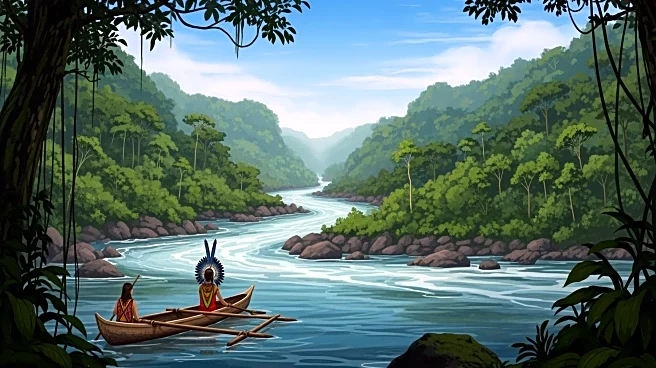What's Happening?
A decade after the catastrophic collapse of a mining dam in Mariana, Brazil, Indigenous communities, particularly the Krenak people, continue to demand justice and reparations. The disaster, which occurred on November 5, 2015, involved a dam owned by
Samarco, a joint venture between Vale and BHP Billiton, releasing toxic iron ore waste into the Doce River. This event resulted in the deaths of 19 people and extensive environmental damage, affecting nearly 600 kilometers of waterways. The Krenak people, who have historically relied on the river for sustenance and cultural practices, describe the event as a profound spiritual and environmental loss. Despite a $23 billion settlement reached in 2024 to address social and environmental damages, the river remains contaminated, and local communities report little improvement.
Why It's Important?
The ongoing struggle for justice highlights significant gaps in Brazil's environmental governance and the challenges faced by Indigenous communities in securing reparations. The unresolved issues surrounding the Mariana disaster cast doubt on Brazil's credibility as a leader in global climate policy, especially as it prepares to host the COP30 climate summit. The situation underscores the need for stronger environmental protections and accountability measures to prevent future disasters. The lack of progress in addressing the aftermath of the dam collapse also raises concerns about the effectiveness of Brazil's environmental policies and the potential for similar incidents, as seen in the 2019 Brumadinho dam disaster.
What's Next?
As Brazil hosts COP30, there is increased pressure on the government to demonstrate genuine commitment to environmental justice and Indigenous rights. The Krenak and other affected communities continue to advocate for meaningful reparations and restoration of their lands. The international community, including environmental and Indigenous rights organizations, may increase scrutiny on Brazil's environmental policies and push for more robust protections. The outcome of COP30 could influence Brazil's future environmental strategies and its role in global climate leadership.
Beyond the Headlines
The Mariana disaster serves as a stark reminder of the broader implications of industrial activities on Indigenous lands and the environment. It highlights the ethical and cultural dimensions of environmental justice, emphasizing the need for policies that prioritize the rights and well-being of Indigenous communities. The event also reflects the ongoing tension between economic development and environmental sustainability, a challenge faced by many countries globally.














